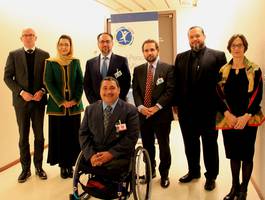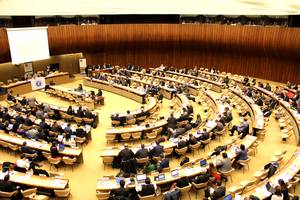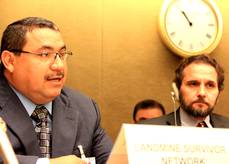|
27.11.2018
Download the press releaseFind photos of the meeting hereGeneva – Over 600 delegates representing 113 States (103 States Parties and 10 that have not yet joined), international and non-governmental organisations are meeting at the UN in Geneva from 26-30 November, to take stock of challenges that remain in implementing mine clearance, stockpile destruction and victim assistance obligations under the Anti-Personnel Mine Ban Convention.
The Seventeenth Meeting of the States Parties (17MSP) was opened on 26 November 2018 by the Minister of Foreign Affairs of Afghanistan H.E Salahuddin Rabbani joined by the Ambassador of Afghanistan to Switzerland and UN in Geneva and Convention Chair H.E. Suraya Dalil; the Convention’s Special Envoy HRH Prince Mired Raad Zeid Al-Hussein of Jordan; Founder of El Salvador’s Network of Landmine Survivors Jesus Martinez, and high-level representatives of the International Committee of the Red Cross (ICRC) and the Director of the International Campaign to Ban Landmines (ICBL) Hector Guerra. The theme of improvised anti-personnel landmines is high on the Meeting’s agenda.
“We are confronting new challenges, especially in conflict settings, arising from large-scale new contamination from landmines and other improvised explosive devices, including those used by terrorist groups and armed non-state actors,” said H.E Salahuddin Rabbani. “Countering the threat of IEDs is an imperative being pursued by Afghanistan, nationally and internationally. In 2017, over 2,000 Afghans were killed or injured by landmines and explosive remnants of war. This figure marks a substantial increase in comparison to previous years”, added the Minister. In spite of challenges faced, Afghanistan has continued to meet its mine clearance commitments. “To this end, we are pleased to report that approximately 3,000 square kilometres have been cleared and over 19 million landmines and explosive remnants of war destroyed since demining operations first began in 1989.” The Convention’s Special Envoy Prince Mired of Jordan, also highlighted the damages inflicted by anti-personnel mines of an improvised nature. “Today, an unfortunate situation exists in which anti-personnel mines of an improvised nature are being used on a larger scale than ever before. We must continue to condemn the use of these weapons by any actor anywhere. We must strongly urge all mine-affected countries, including those affected by weapons of an improvised nature, to embrace the concept of ownership and to take the issue at hand very seriously; it is the only way, we believe, that true progress will be realized,” said HRH. The meeting comes on the heel of the Landmine Monitor report 2018 indicating a rise in landmine causalities, mainly as a result of growing use of improvised mines. According to the Monitor, civilians account for 78% of causalities with children representing a large percentage of these figures. This means new generations, many in some of the poorest regions of the world, will require sustained care and rehabilitation for decades to come.
Jesus Martinez founder of El Salvador’s Network of Landmine Survivors, and a landmine survivor himself, called on the States Parties to fulfil their victim assistance obligations under the Convention. The Convention is the prime humanitarian and disarmament treaty aimed at ending the suffering caused by landmines by prohibiting their use, stockpiling, production and transfer, ensuring their destruction and assisting the victims of these weapons. It was adopted on 18 September 1997 and entered into force on 1 March 1999. Together, the 164 States Parties have destroyed more than 51 million landmines and 158 States Parties have fulfilled their stockpile destruction obligation. For more information, contact the Convention's Implementation Support Unit, isu(at)apminebanconvention.org |







